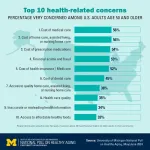(Press-News.org) HOUSTON ― For most smokers, quitting on the first attempt is likely to be unsuccessful, but a new study from The University of Texas MD Anderson Cancer Center found patients were more likely to quit if their cessation regimen was altered and doses were increased. Researchers also found that varenicline, a cessation medication, was more effective than combined nicotine replacement therapy (CNRT), such as patches or lozenges.
The study, published today in JAMA, revealed smokers who failed to quit with varenicline in the trial’s first phase were seven times more likely to quit by the end of the second phase if varenicline doses were increased. There also was a nearly two-fold increase in those who successfully quit if they were switched from a CNRT regimen to varenicline. These results are favorable compared to the near zero chance of abstinence seen in patients who were switched from varenicline to CRNT or left on the same treatment plans.
"These data indicate that sticking to the same medication isn't effective for smokers who are unable to quit in the first six weeks of treatment," said lead researcher Paul Cinciripini, Ph.D., chair of Behavioral Science. “Our study should encourage doctors to check in on patients early in their cessation journey and, if patients are struggling, to try a new approach, such as increasing medication dosage."
The double-blind, placebo-controlled trial followed 490 smokers who were randomized to receive six weeks of varenicline or CNRT. After the first phase, those unable to quit were re-randomized to continue, switch or increase medication dose for an additional six weeks. Initial treatment included 2 mg of varenicline or CNRT (21 mg patch plus 2 mg lozenge). Participants who were re-randomized either continued the same varenicline or CNRT dose, switched between varenicline and CNRT, or were given an increased dose of 3 mg of varenicline or CNRT (42 mg patch plus 2 mg lozenge). The study was conducted in Texas from June 2015 to October 2019.
Of the patients who received varenicline and had their doses increased, 20% were still abstaining six weeks later. Meanwhile, the abstinence rate was 14% among patients who switched from CRNT to varenicline or who had their CRNT doses increased. However, varenicline patients who switched to CNRT saw a 0% quit rate. After six months, only those who had their doses increased remained continuously abstinent.
Tobacco use remains the leading preventable cause of death and disease in the U.S. Each year, about 480,000 Americans die from tobacco-related illnesses. Currently, more than 16 million Americans suffer from at least one disease caused by smoking, including cancer. Quitting tobacco can improve the chances of survival by 30-40% for cancer patients who smoke. Since the average smoker makes several attempts to quit before successfully beating the addiction, MD Anderson tackles the barriers to cessation at an individual and population level, factoring in cost, access to cessation services, and knowledge gaps among health care providers on treating tobacco addiction.
In a larger ongoing trial, researchers are testing several different medication combinations as an alternative for those unable to quit on their initial doses of varenicline or CNRT.
The research was supported by the Cancer Prevention and Research Institute of Texas (CPRIT) (RP150228), MD Anderson’s Lung Cancer Moon Shot®, the National Cancer Institute (P30CA016672), and the State of Texas Permanent Health Funds awarded to MD Anderson. Varenicline and matching placebo were provided by Pfizer Pharmaceuticals (WI192533). CRNT products and matching placebo were purchased from NAL Pharma. A full list of collaborating authors and their disclosures can be found here.
END
Increasing doses of varenicline or nicotine replacement helps persistent smokers quit
Trial finds smokers who previously tried to quit and failed had greater cessation success if their treatment plan doses were increased or, in some cases, altered
2024-05-02
ELSE PRESS RELEASES FROM THIS DATE:
Artificial intelligence yields promising results for advancing coronary angiography
2024-05-02
Long Beach, Calif. – May 2, 2024 – New insights from the AI-ENCODE study showed artificial intelligence (AI) successfully allowed the automated extraction of key functional and physiological data from routine angiograms. The late-breaking results were presented today at the Society for Cardiovascular Angiography & Interventions (SCAI) 2024 Scientific Sessions.
Coronary angiography is a widely used diagnostic procedure for identifying coronary artery disease (CAD), performed in over one million patients annually in the United States. Currently, data extracted from coronary angiograms are confined to detecting blockages in the coronary arteries. However, AI technology ...
Non-fasting pre-procedural strategy for cardiac catheterization significantly improved patient well-being and satisfaction
2024-05-02
Long Beach, Calif. – May 2, 2024 – New data from the CALORI Cardiac Catheterization trial shows significant improvement in patient well-being and satisfaction without compromising safety after implementation of a liberal non-fasting strategy prior to a cardiac catheterization procedures. The late-breaking results were presented today at the Society for Cardiovascular Angiography & Interventions (SCAI) 2024 Scientific Sessions.
More than one million cardiac catheterizations are performed each year in the U.S. to diagnose heart problems. The risk of complications ...
Gene therapy treatment increasing body’s signal for new blood vessel growth shows promise
2024-05-02
Long Beach, Calif. – May 2, 2024 – Final 12-month data from the EXACT trial demonstrates safety and efficacy results for a vascular endothelial growth factor (VEGF) gene therapy treatment for patients who have advanced coronary artery disease (CAD). The late-breaking results were presented today at the Society for Cardiovascular Angiography & Interventions (SCAI) 2024 Scientific Sessions.
CAD, also known as coronary heart disease or ischemic heart disease, affects about 20.5 million U.S. adults – making it the most common type of heart disease in the ...
Novel score system accurately identifies lesions reducing risk of PCI complications
2024-05-02
Long Beach, Calif. – May 2, 2024 – New data demonstrated that a left main (LM) bifurcation-specific novel scoring system (LM V-RESOLVE), based on three simple baseline angiographic findings, could help to rapidly discriminate lesions at risk of side branch (SB) occlusion during LM bifurcation percutaneous coronary intervention (PCI) – reducing risk during the procedure. The results from the prospective trial were presented today as late-breaking science at the Society for Cardiovascular Angiography & Interventions (SCAI) ...
Women need better treatments for bacterial vaginosis
2024-05-02
BALTIMORE, May 2, 2024: Bacterial Vaginosis (BV) affects about one-quarter of reproductive-age women and is linked to adverse health outcomes, such as increased HIV risk. Yet for decades, BV treatment in the United States has largely relied on antibiotics, and BV recurrence is common following antibiotic therapy.
Now, two European clinical trials have shown limited success with a different type of medication used to treat BV called dequalinium chloride (DQC). DQC—an antiseptic—has been in use for several decades in countries throughout Europe as an alternative treatment for BV. It is not currently approved by the U.S. ...
Webb telescope probably didn’t find life on an exoplanet — yet
2024-05-02
Recent reports of NASA’s James Webb Space Telescope finding signs of life on a distant planet understandably sparked excitement. A new study challenges this finding, but also outlines how the telescope might verify the presence of the life-produced gas.
The UC Riverside study, published in the Astrophysical Journal Letters, may be a disappointment to extraterrestrial enthusiasts but does not rule out the near-future possibility of discovery.
In 2023 there were tantalizing reports of a biosignature gas in the atmosphere of planet K2-18b, ...
Radial arterial access found superior to femoral access in percutaneous coronary intervention
2024-05-02
Long Beach, Calif. – May 2, 2024 – New data demonstrate the superiority of radial arterial access compared to femoral arterial access for coronary interventions. Findings showed radial access was associated with lower rates of in-hospital mortality, major access bleeding, and other major vascular complications compared with femoral access. The late-breaking results were presented today at the Society for Cardiovascular Angiography & Interventions (SCAI) 2024 Scientific Sessions.
Historically, femoral arterial access, through the groin, for percutaneous coronary intervention (PCI) was the standard. Radial access, or ...
Money on their minds: Health-related costs top older adults’ concerns for people their age, poll finds
2024-05-02
From medical and dental care to medications, insurance and nursing homes, health-related costs weigh heavily on the minds of older Americans of all backgrounds, a new poll suggests.
Asked to rate their level of concern about 26 different health-related topics for people over 50 in their community, five of the six issues that the most people cited as very concerning involved health costs.
The sixth – financial scams and fraud – also had to do with money.
Those same six topics rose to the top no matter what ...
To bend the curve of biodiversity loss, nature recovery must be integrated across all sectors
2024-05-02
The alarming rates of biodiversity loss worldwide have made clear that the classical way of governing biodiversity recovery based on protected areas and programmes for the protection of endangered species is not enough. To tackle this, almost 200 countries committed to the active ‘mainstreaming’ or integration of biodiversity targets into policies and plans across relevant sectors. However, research led by Utrecht University and UFZ Helmholz Centre for Environmental Research suggests that this has until now been largely ineffective due to non-binding commitments, ...
Singapore study identifies immunity threshold for protection against COVID-19 in children
2024-05-02
As COVID-19 becomes endemic, an important group of people who continue to require vaccination is future birth cohorts of children. Yet, in the face of ever-changing variants, as well as the waning of antibodies with time after each dose, key questions remain: What is the threshold of immune response against SARS-CoV-2 needed to protect against COVID-19 and how many doses of mRNA vaccination are required to reach that threshold?
Researchers answered this question in a joint study conducted by the NUS Yong Loo Lin School of Medicine (NUS Medicine) and Duke-NUS Medical School. With parental consent ...
LAST 30 PRESS RELEASES:
Justice after trauma? Race, red tape keep sexual assault victims from compensation
Columbia researchers awarded ARPA-H funding to speed diagnosis of lymphatic disorders
James R. Downing, MD, to step down as president and CEO of St. Jude Children’s Research Hospital in late 2026
A remote-controlled CAR-T for safer immunotherapy
UT College of Veterinary Medicine dean elected Fellow of the American Academy of Microbiology
AERA selects 34 exemplary scholars as 2026 Fellows
Similar kinases play distinct roles in the brain
New research takes first step toward advance warnings of space weather
Scientists unlock a massive new ‘color palette’ for biomedical research by synthesizing non-natural amino acids
Brain cells drive endurance gains after exercise
Same-day hospital discharge is safe in selected patients after TAVI
Why do people living at high altitudes have better glucose control? The answer was in plain sight
Red blood cells soak up sugar at high altitude, protecting against diabetes
A new electrolyte points to stronger, safer batteries
Environment: Atmospheric pollution directly linked to rocket re-entry
Targeted radiation therapy improves quality of life outcomes for patients with multiple brain metastases
Cardiovascular events in women with prior cervical high-grade squamous intraepithelial lesion
Transplantation and employment earnings in kidney transplant recipients
Brain organoids can be trained to solve a goal-directed task
Treatment can protect extremely premature babies from lung disease
Roberto Morandotti wins prestigious Max Born Award for pioneering research in quantum photonics
Scientists map brain's blood pressure control center
Acute coronary events registry provides insights into sex-specific differences
Bar-Ilan University and NVIDIA researchers improve AI’s ability to understand spatial instructions
New single-cell transcriptomic clock reveals intrinsic and systemic T cell aging in COVID-19 and HIV
Smaller fish and changing food webs – even where species numbers stay the same
Missed opportunity to protect pregnant women and newborns: Study shows low vaccination rates among expectant mothers in Norway against COVID-19 and influenza
Emotional memory region of aged brain is sensitive to processed foods
Neighborhood factors may lead to increased COPD-related emergency department visits, hospitalizations
Food insecurity impacts employees’ productivity
[Press-News.org] Increasing doses of varenicline or nicotine replacement helps persistent smokers quitTrial finds smokers who previously tried to quit and failed had greater cessation success if their treatment plan doses were increased or, in some cases, altered








